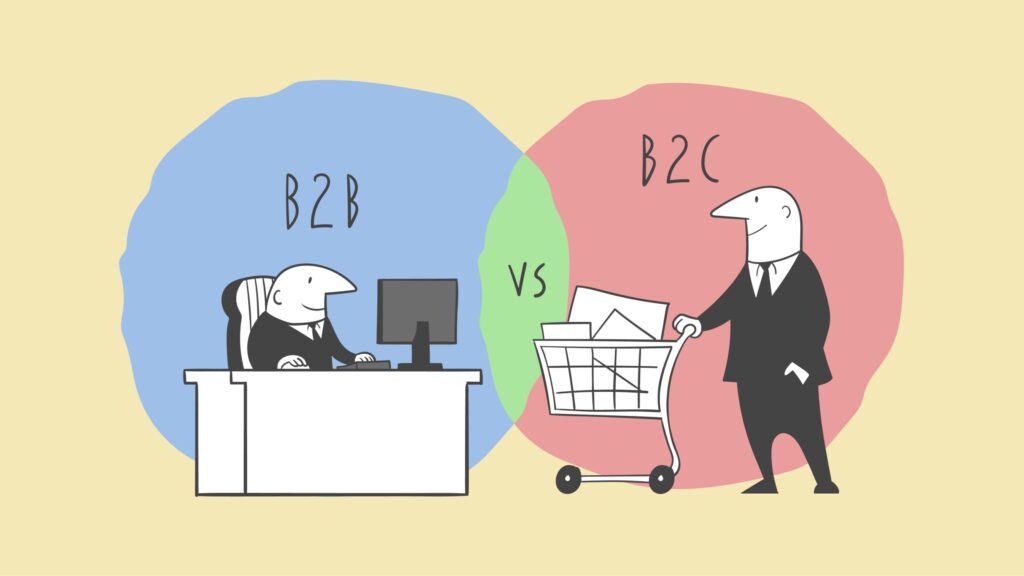Table of Contents
Let’s clear the air—B2B vs B2C marketing isn’t just about who you’re selling to. It’s about how people think, behave, and decide depending on the role they’re playing—either as a consumer or as a business representative.
Whether your audience is a corporate buyer or a stay-at-home shopper, the marketing approach must adapt accordingly. From tone to tactics, every step in the journey is different.
So what exactly separates the two? Let’s dive into the top 7 differences in Final Thought: Don’t Blend—Differentiate
1. Audience Mindset: Logic vs Emotion
At the heart of B2B vs B2C marketing lies this major difference: how buyers think.
- B2B buyers make rational, logic-based decisions. They care about efficiency, ROI, compliance, and long-term gains.
- B2C buyers lean into emotions. Convenience, aesthetics, impulse, and desire drive their actions.
Example:
Selling cloud software? In B2B, focus on “uptime,” “security,” and “integration.” For B2C, focus on “easy to use,” “keep your memories safe,” or “no more lost files.”
That’s why understanding emotional vs practical triggers is key in B2B vs B2C marketing.
2. Sales Cycle: Long vs Short
In B2B marketing, the sales process is often long, strategic, and involves multiple stages—awareness, consideration, validation, and approval.
In contrast, B2C marketing usually has a short cycle. A catchy ad or a flash sale could trigger an immediate purchase.
In B2B vs B2C marketing, time is a crucial differentiator. Businesses take time to decide, consumers may act on a whim.
3. Decision Makers: One vs Many
This is a critical difference in B2B vs B2C marketing.
- B2C targets one buyer—the end user.
- B2B often targets a group: decision-makers, influencers, and users across departments like finance, IT, or operations.
Your messaging in B2B must speak to each role in the buying committee. But in B2C, you focus on the individual’s personal needs or desires.
Understanding the number of decision-makers and their roles is vital in winning at B2B vs B2C marketing.
4. Content Types and Channels
In B2B marketing, you’re more likely to use content like:
- Whitepapers
- Case studies
- Webinars
- LinkedIn articles
These cater to an audience that researches thoroughly and values data.
In B2C marketing, platforms like Instagram, TikTok, YouTube, and email are more dominant. Content is short, emotional, and visually engaging.
The type and style of content greatly differ between B2B vs B2C marketing—and knowing which fits where can make or break your campaign.
5. Brand Voice and Tone
Brand voice is another defining feature in B2B vs B2C marketing.
- B2B brands use a more formal, informative, and expert tone.
- B2C brands sound friendly, relatable, even playful.
Example:
A B2B headline: “Unlock Advanced Workflow Automation with 24/7 Support.”
A B2C headline: “Work smarter, not harder—manage everything with one tap!”
In B2B vs B2C marketing, tone can affect trust. Be sure your tone matches your audience’s expectations and comfort zone.
6. Buyer Relationships and Retention
In B2B, the relationship doesn’t end at the sale. Account managers, service agreements, renewals, and support systems all come into play. You’re building long-term partnerships.
In B2C, while retention matters, it’s often achieved through loyalty programs, retargeting ads, and brand identity.
B2B vs B2C marketing requires different retention strategies—but both aim to keep customers engaged and coming back.
7. Conversion Goals and Tracking
Your conversion strategy in B2B vs B2C marketing varies significantly.
- B2B tracks leads, demo signups, sales meetings, and contract closings.
- B2C focuses on cart completions, app downloads, or online purchases.
That means your KPIs and marketing funnel should be tailored accordingly. Don’t measure success the same way in both models.
Summary: Key Differences Between B2B vs B2C Marketing
Here’s a snapshot of how the two models stack up:
| Aspect | B2B Marketing | B2C Marketing |
|---|---|---|
| Audience Type | Businesses and professionals | Individual consumers |
| Buying Motivation | Logic, ROI, long-term goals | Emotion, desire, personal benefit |
| Sales Cycle | Long and complex | Short and quick |
| Content Style | Educational, data-driven | Visual, emotional, entertaining |
| Decision-Making Group | Multiple stakeholders | Single buyer |
| Tone and Language | Professional, expert | Casual, engaging |
| Conversion Focus | Leads and deals | Purchases and signups |
Final Thought: Don’t Blend—Differentiate
When businesses fail to recognize the nuances between B2B vs B2C marketing, they risk misfiring completely. You can’t sell to a CEO the same way you sell to a college student. And vice versa.
Craft your message, choose your platform, and build your funnel based on your audience’s unique journey.
Whether you’re selling software to enterprises or skincare to individuals, success in B2B vs B2C marketing depends on how well you understand—and speak to—your buyer.

